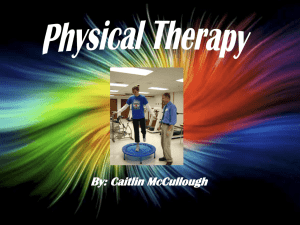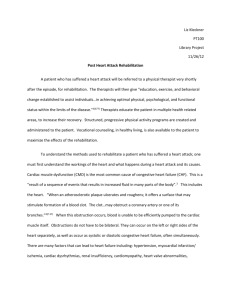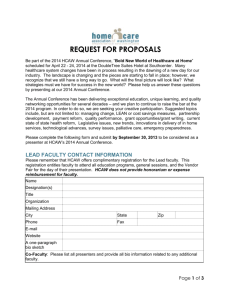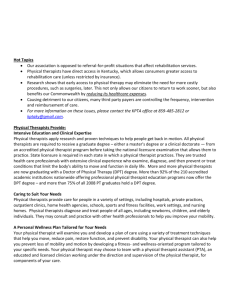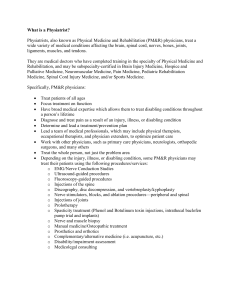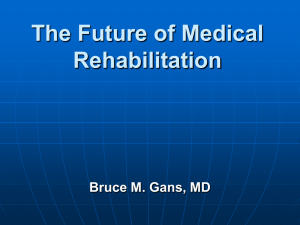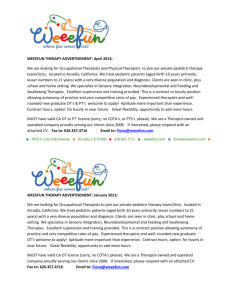Rehabilitation therapists` clinical questions in the context of
advertisement
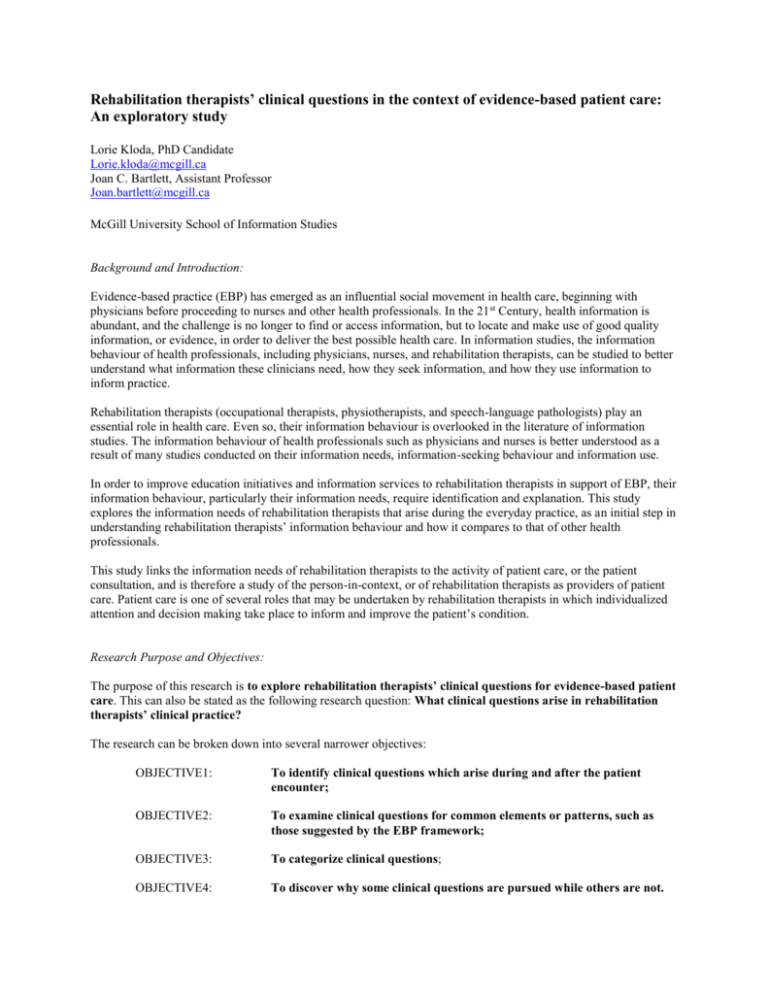
Rehabilitation therapists’ clinical questions in the context of evidence-based patient care: An exploratory study Lorie Kloda, PhD Candidate Lorie.kloda@mcgill.ca Joan C. Bartlett, Assistant Professor Joan.bartlett@mcgill.ca McGill University School of Information Studies Background and Introduction: Evidence-based practice (EBP) has emerged as an influential social movement in health care, beginning with physicians before proceeding to nurses and other health professionals. In the 21 st Century, health information is abundant, and the challenge is no longer to find or access information, but to locate and make use of good quality information, or evidence, in order to deliver the best possible health care. In information studies, the information behaviour of health professionals, including physicians, nurses, and rehabilitation therapists, can be studied to better understand what information these clinicians need, how they seek information, and how they use information to inform practice. Rehabilitation therapists (occupational therapists, physiotherapists, and speech-language pathologists) play an essential role in health care. Even so, their information behaviour is overlooked in the literature of information studies. The information behaviour of health professionals such as physicians and nurses is better understood as a result of many studies conducted on their information needs, information-seeking behaviour and information use. In order to improve education initiatives and information services to rehabilitation therapists in support of EBP, their information behaviour, particularly their information needs, require identification and explanation. This study explores the information needs of rehabilitation therapists that arise during the everyday practice, as an initial step in understanding rehabilitation therapists’ information behaviour and how it compares to that of other health professionals. This study links the information needs of rehabilitation therapists to the activity of patient care, or the patient consultation, and is therefore a study of the person-in-context, or of rehabilitation therapists as providers of patient care. Patient care is one of several roles that may be undertaken by rehabilitation therapists in which individualized attention and decision making take place to inform and improve the patient’s condition. Research Purpose and Objectives: The purpose of this research is to explore rehabilitation therapists’ clinical questions for evidence-based patient care. This can also be stated as the following research question: What clinical questions arise in rehabilitation therapists’ clinical practice? The research can be broken down into several narrower objectives: OBJECTIVE1: To identify clinical questions which arise during and after the patient encounter; OBJECTIVE2: To examine clinical questions for common elements or patterns, such as those suggested by the EBP framework; OBJECTIVE3: To categorize clinical questions; OBJECTIVE4: To discover why some clinical questions are pursued while others are not. Methods: The research study will employ a qualitative approach using the social constructionist epistemology (Berger and Luckman, 1966). In the context of patient care, rehabilitation therapists working in stroke care (the study’s informants) will be asked to record clinical questions as they arise. Employing purposive, snowball sampling (Patton, 2002), the informants will be recruited from at least three rehabilitation centres in the Montreal area. Their clinical questions will be analyzed against existing question-framing structures proposed by EBP (Bennett & Bennett, 2000; Dawes et al., 2005; Richardson et al., 1995; Schlosser et al., 2007). In addition, narrative interviews will be conducted with each informant to elucidate more details about the clinical questions, and about why they were or were not pursued. Data will be analyzed to uncover themes or patterns associated with clinical question types, structures, and whether or not answers were sought. Results: Preliminary results will be presented following analysis of the informants enrolled in the study between April and September 2009. Significance: The research has implications for healthcare professionals and librarians. The results will provide insight not only into the clinical questions in rehabilitation therapists’ everyday clinical practice, but into the motivations for answering (or not answering) these questions. As a result, healthcare administrators and educators will be better prepared to facilitate EBP, this improving the care provided to patients. To enable rehabilitation therapists to locate evidence for EBP, effective strategies for teaching information skills as well as tools for disseminating research results are required. The results of this study will provide information that can be used in the design of tools by librarians and other information providers in order to teach question formulation and enable access to evidence. It will also satisfy the curiosity of health science librarians, who want to understand how to support the work of rehabilitation therapists in their everyday practice. The results of this research will supplement current knowledge about the information needs of other healthcare professionals, and add another dimension to current information behaviour models. References Bennett, S. & Bennett, J. W. (2000). The process of evidence-based practice in occupational therapy: Informing clinical decisions. Australian Occupational Therapy Journal, 47, 171-180. Berger, P. L. & Luckmann, T. (1966). The Social Construction of Reality: A Treatise in the Sociology of Knowledge. Garden City, N.Y.: Doubleday. Dawes, M., Pluye, P., Shea, L., Grad, R. M., Greenberg, A., & Nie, J.-Y. (2007). The identification of clinically important elements within medical journal abstracts: Patient-population-problem, exposure-intervention, comparison, outcome, duration and results (PECODR). Informatics in Primary care, 15, 9-16. Patton, M. Q. (2002). Designing qualitative studies. In Qualitative Research and Evaluation Methods (pp. 209257). Thousand Oaks: Sage. Richardson, W., Wilson, M., Nishikawa, J., & Hayward, R. (1995). The well-built clinical question: A key to evidence-based decisions. ACP Journal Club, 123, A12-A13. Schlosser, R. W., Koul, R., & Costello, J. (2007). Asking well-built questions for evidence-based practice in augmentative and alternative communication. Journal of Communication Disorders, 40, 225-238.
